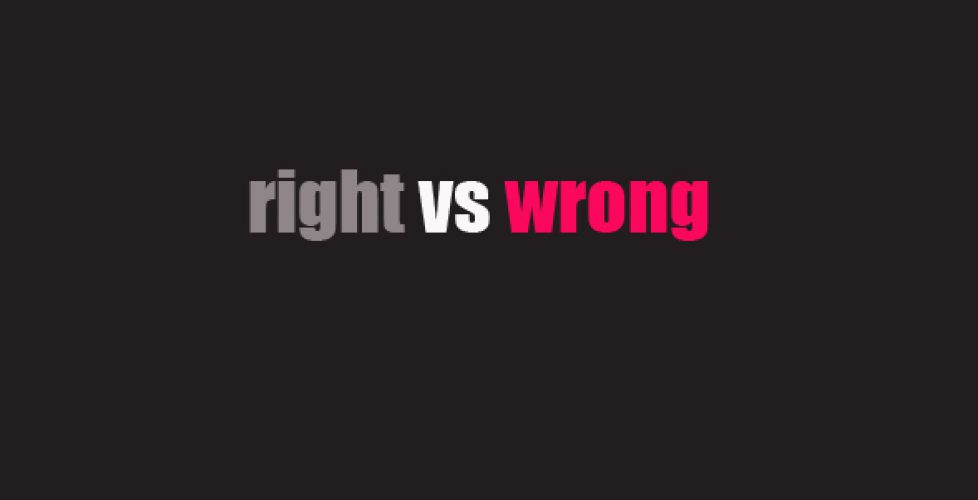Right and Wrong vs. Success
Lately, I’m finding myself in several different conversations about “right and wrong” as it pertains to marketing tactics. Now, right and wrong are taught to us and always subjective, but most people have an internal compass and we know which way it’s pointing most of the time. Unfortunately, the marketing profession is filled with individuals and companies who are completely comfortable doing things that are wrong—as long as they make money.
What’s funny is that these same people will use that material success to justify the “rightness” of things that are clearly wrong. Let’s get specific and I’ll show you.
Should you sell on LinkedIn?
I think if you’re trying to build relationships on a platform, you put those relationships in immediate and critical risk when you try to “sell” them something directly using a direct message on the platform. When I connect with someone and the first message I get is all about them and their wonderful products and services, it is typically the first and the last time we speak. Because if they are SO interested in selling me immediately, I tend to think of them as out for themselves and not really about me or my needs at all. Most people are like that but they aren’t as direct in telling you. They just won’t respond and they will quietly unfollow you. But I don’t hold back.
Now as wrong as it feels and it is to sell on LinkedIn, I have several LinkedIn marketing “gurus” who regularly justify this practice by telling me — “Scott, I made over $20K last month doing this!” Right, and with my marketing skills I could be a very successful crack dealer. I could build quite an impressive worldwide crack network and probably just destroy the competition with my storytelling skills mixed with the highly addictive nature of crack. HOWEVER….it’s wrong. Crack hurts people, destroys their lives and if I’m associated with it, then I did that, too. Material success does NOT make something right.
Here’s another good one —
Should you pay Forbes (or another publication) $5K per year for unlimited article publishing capability for you and your clients?
Forbes has this thing called “The Forbes Council” and they ask “thought leaders” (aka business people and PR firms with checks that do not bounce) to contribute content to Forbes.com so you can tell people — “oh yeah, that’s my latest article in Forbes.” Uh huh. Forbes and other media outlets (Entrepreneur, Rolling Stone, Inc, Fortune) do a pretty poor job at clearly communicating the money paid by the authors part upfront, SO you have a fairly deceptive situation going on here and it has been going on since about 2014. (Yeah, they asked me and I said no). Now, some smart PR people tell me — “yes, we do this and we write articles about our clients and “get” them into Forbes.” “Scott — it’s a lock!” Did you? Did you really? Do you remember WHY we care about earned media coverage? Starts with a T with a —RUST after it.
Oh right, Scott, but the clients don’t know or care — they are just SO happy to be in Forbes. Hmmmm. So it’s ok to deceive your clients IF they don’t know the difference or care? Well, what if they share this lovely paid (but not clearly disclosed as such) article with an individual who happens to know about Forbes’ questionable editorial business practices? What then? The entire model relies on the audience not catching on—and folks, that is just bad business. You might be fine getting away with it, but that doesn’t mean it’s ok.
You know, it’s much easier to be wrong. Much easier to make money, deceive people, invade their privacy, interrupt them, burn bridges and yes even move that giant warehouse full of crack, etc. BUT…you still have to LIVE with you—and sooner or later, the bill always comes due.
When you trying to build relationships (the goal of all marketing activities), you want to do it the right way by doing the right things and staying on the RIGHT side of the line. Even if you can make a whole bunch of money doing it the other way, I’ll submit that you could be giving up some far more valuable and pretty much irreplaceable. For what? For money? For the perception of temporary success?
Ladies and gentlemen, right is still right just because it is—and wrong is still wrong for pretty much the same reasons. Search your feelings and if it FEELS wrong, then you already know what NOT to do. Choose wisely.

